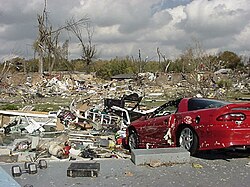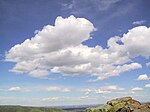The weather portal
Weather is the state of the atmosphere, describing for example the degree to which it is hot or cold, wet or dry, calm or stormy, clear or cloudy. On Earth, most weather phenomena occur in the lowest layer of the planet's atmosphere, the troposphere, just below the stratosphere. Weather refers to day-to-day temperature, precipitation, and other atmospheric conditions, whereas climate is the term for the averaging of atmospheric conditions over longer periods of time. When used without qualification, "weather" is generally understood to mean the weather of Earth.
Weather is driven by air pressure, temperature, and moisture differences between one place and another. These differences can occur due to the Sun's angle at any particular spot, which varies with latitude. The strong temperature contrast between polar and tropical air gives rise to the largest scale atmospheric circulations: the Hadley cell, the Ferrel cell, the polar cell, and the jet stream. Weather systems in the middle latitudes, such as extratropical cyclones, are caused by instabilities of the jet streamflow. Because Earth's axis is tilted relative to its orbital plane (called the ecliptic), sunlight is incident at different angles at different times of the year. On Earth's surface, temperatures usually range ±40 °C (−40 °F to 104 °F) annually. Over thousands of years, changes in Earth's orbit can affect the amount and distribution of solar energy received by Earth, thus influencing long-term climate and global climate change.
Surface temperature differences in turn cause pressure differences. Higher altitudes are cooler than lower altitudes, as most atmospheric heating is due to contact with the Earth's surface while radiative losses to space are mostly constant. Weather forecasting is the application of science and technology to predict the state of the atmosphere for a future time and a given location. Earth's weather system is a chaotic system; as a result, small changes to one part of the system can grow to have large effects on the system as a whole. Human attempts to control the weather have occurred throughout history, and there is evidence that human activities such as agriculture and industry have modified weather patterns.
Studying how the weather works on other planets has been helpful in understanding how weather works on Earth. A famous landmark in the Solar System, Jupiter's Great Red Spot, is an anticyclonic storm known to have existed for at least 300 years. However, the weather is not limited to planetary bodies. A star's corona is constantly being lost to space, creating what is essentially a very thin atmosphere throughout the Solar System. The movement of mass ejected from the Sun is known as the solar wind. (Full article...)
Selected article

The Evansville Tornado of November 2005 was a powerful tornado that formed early in the morning of November 6, 2005, outside of Evansville, a city in Southwestern Indiana on the Ohio River. It was the first of several significant tornado events in the month of November 2005. The tornado resulted in 25 confirmed fatalities across the region, making it by far the deadliest and most destructive tornado in the United States in 2005, and it was also the deadliest single tornado in the US since 36 died in Oklahoma on May 3, 1999. Significant tornadoes were also reported in western Kentucky on the same day, but none were as damaging or deadly as the Evansville storm.
Recently selected articles: Typhoon Tip, Hurricane Floyd, Hurricane Dean, More...
Did you know (auto-generated) -

- ... that weather whiplash is the phenomenon of rapid swings between extremes of weather conditions?
- ... that the weather forecast for HD 189733 b is "Westerly winds at 2000 m/s, with molten glass showers"?
- ... that Japanese actor Kouhei Higuchi prepared for his role on the television drama adaptation of My Personal Weatherman by learning from a weather forecaster?
- ... that in the 1980s, "Sherman Bonner, The Human Thermometer" presented the weather on an Arkansas TV station?
- ... that a Michigan TV station rescued and restored a weather ball that had been sitting for years in a scrapyard?
- ... that MyRadar uses a custom satellite constellation to help forecast the weather?
Selected image

Ground fog is a name given to fog that forms a shallow layer near the ground, sometimes just tens of centimeters thick. It can form due to warm air moving over a colder surface (advection fog), or at night due to the escape of thermal radiation into space (radiation fog). This scene is in Nordstemmen, Lower Saxony, Germany just after sunset.
Previously selected pictures: noctilucent cloud, Elie, Manitoba tornado, Dust storm from space, More...
More did you know...
...that the Flying river is the name given to the transport of water vapor from the Amazon rainforest to southern Brazil?
...that hurricane shutters are required for all homes in Florida unless impact-resistant glass is used?
...that the Joint Institute for Marine and Atmospheric Research is a combined weather and ocean research institute with the cooperation of the Office of Oceanic and Atmospheric Research and the University of Hawaiʻi?
...that the SS Central America was sunk by a hurricane while carrying more than 30,000 pounds (13,600 kg) of gold, contributing to the Panic of 1857?
...that a hurricane force wind warning is issued by the United States National Weather Service for storms that are not tropical cyclones but are expected to produce hurricane-force winds (65 knots (75 mph; 120 km/h) or higher)?
...that the Automated Tropical Cyclone Forecasting System is a software package for tropical cyclone forecasting developed in 1988 that is still used today by meteorologists in various branches of the US Government?
Recent and ongoing weather
- Wikinews weather portal
- March 26, 2021: Tropical moisture ceases to cause severe floods in South East Australia
- February 19, 2021: Winter storms hammer Texas, fatalities reported
- December 28, 2021: Typhoon Phanfone strikes Philippines
- February 1, 2022: Deadly floods in Brazil after heavy rainfall
- April 15, 2022: South African floods kill at least 300 people
- Weather of 2024
- 2024 Atlantic hurricane season
- 2020–21 North American winter
- 2024 Pacific typhoon season
- Tornadoes of 2024
This week in weather history...
November 18
2014: A major cold snap through much of the US reached its peak, with some temperatures reaching 45 degrees below normal.
November 19
2013: Up to 440 millimetres (17 in) of rain in just 90 minutes caused severe flooding on Sardinia, killing 18 people.
November 20
1996: Hurricane Marco, the longest-lived tropical cyclone ever recorded in the Atlantic Ocean in November, reached its peak intensity while meandering over the Caribbean Sea.
November 21
1992: Cyclone Forrest, which had prompted unprecedented evacuations in Bangladesh before veering eastward, made landfall in northwestern Myanmar causing relatively minor damage.
November 22
1970: Typhoon Patsy struck the coast of Vietnam, causing major damage and killing more than 200 people.
November 23
1984: An unusually strong early-season Nor'easter reached its peak intensity off the coast of Florida.
November 24
1703: An intense European windstorm began to affect southern England and the English Channel. This storm or series of storms would last for more than a week, killing as many as 15,000 at sea.
Selected biography
Christophorus Henricus Diedericus Buys Ballot (Dutch pronunciation: [ˈbœyz bɑˈlɔt]; October 10, 1817 – February 3, 1890) was a Dutch chemist and meteorologist after whom Buys Ballot's law and the Buys Ballot table are named. He was first chairman of the International Meteorological Organization, the organization that would become the World Meteorological Organization. (Full article...)
Previously selected biographies: Sir William Napier Shaw, Johannes Peter Letzmann, More...
Related portals
Quality content
Other candidates:
- Featured Article Review: 2005 Atlantic hurricane season (Discussion)
- Featured List Removal Candidate: List of storms in the 2005 Atlantic hurricane season (Discussion)
Subcategories
WikiProjects
The scope of WikiProject Weather is to have a single location for all weather-related articles on Wikipedia.
WikiProject Meteorology is a collaborative effort by dozens of Wikipedians to improve the quality of meteorology- and weather-related articles. If you would like to help, visit the project talk page, and see what needs doing.
WikiProject Severe weather is a similar project specific to articles about severe weather. Their talk page is located here.
WikiProject Tropical cyclones is a daughter project of WikiProject meteorology. The dozens of semi-active members and several full-time members focus on improving Wikipedia's coverage of tropical cyclones.
WikiProject Non-tropical storms is a collaborative project to improve articles related to winter storms, wind storms, and extratropical cyclones.
Wikipedia is a fully collaborative effort by volunteers. So if you see something you think you can improve, be bold and get to editing! We appreciate any help you can provide!
Associated Wikimedia
The following Wikimedia Foundation sister projects provide more on this subject:
-
Commons
Free media repository -
Wikibooks
Free textbooks and manuals -
Wikidata
Free knowledge base -
Wikinews
Free-content news -
Wikiquote
Collection of quotations -
Wikisource
Free-content library -
Wikiversity
Free learning tools -
Wiktionary
Dictionary and thesaurus
































